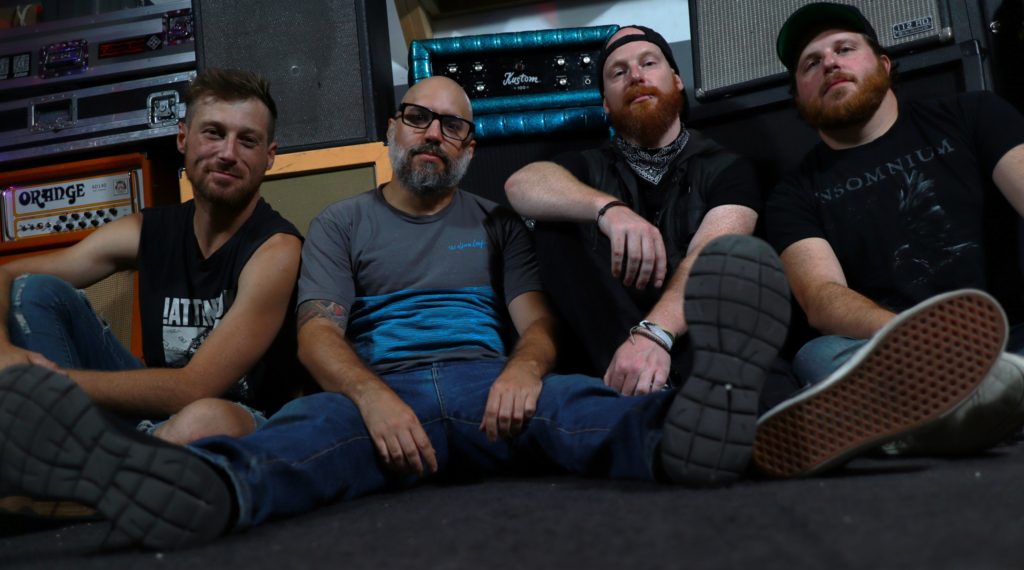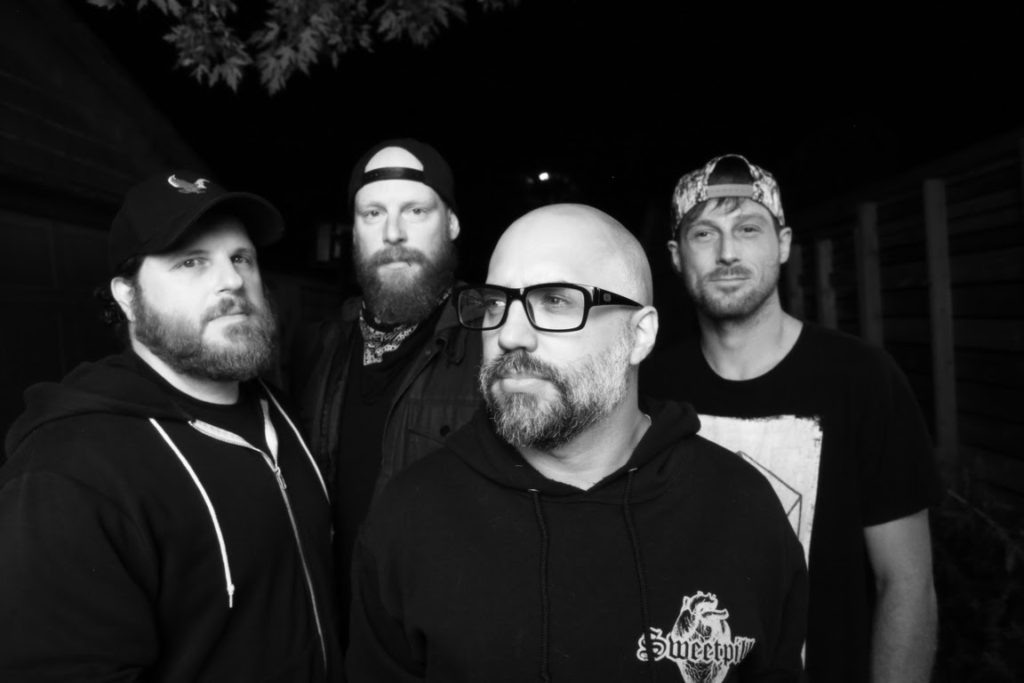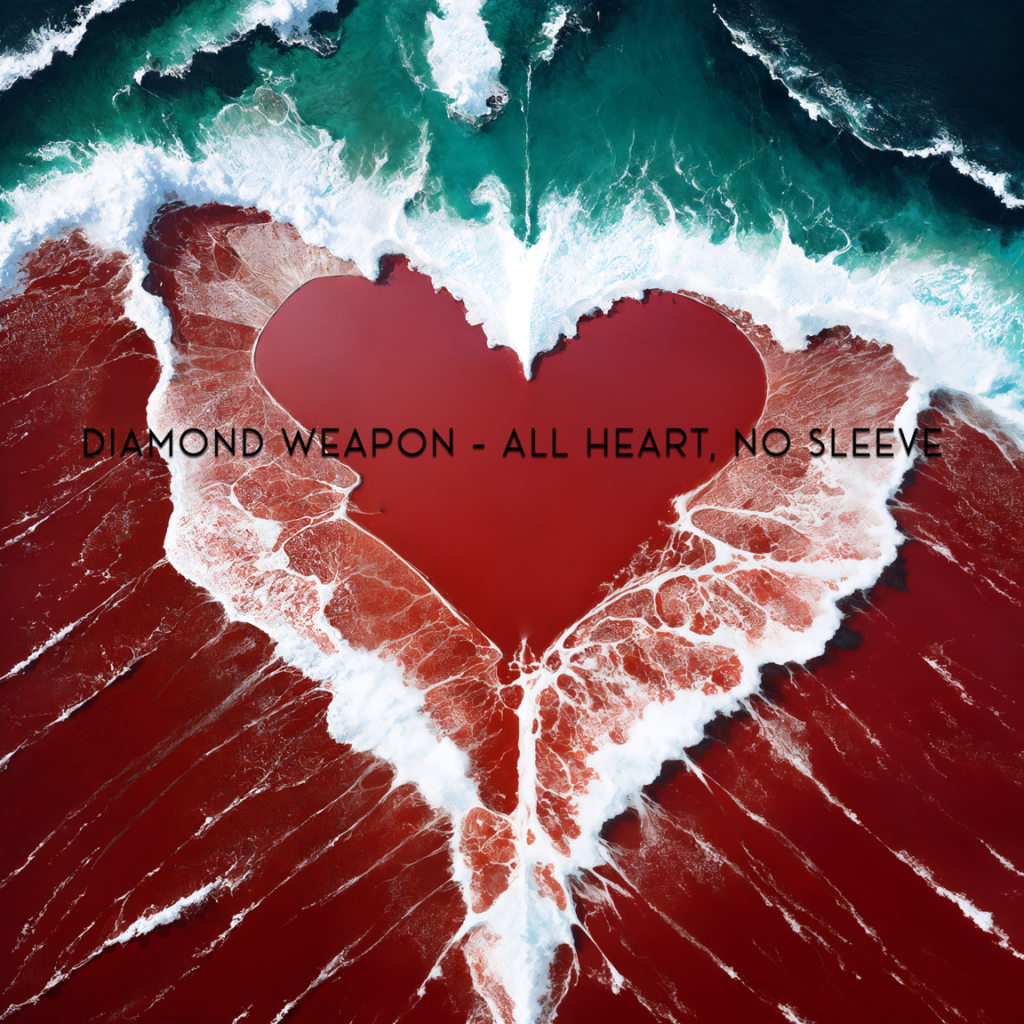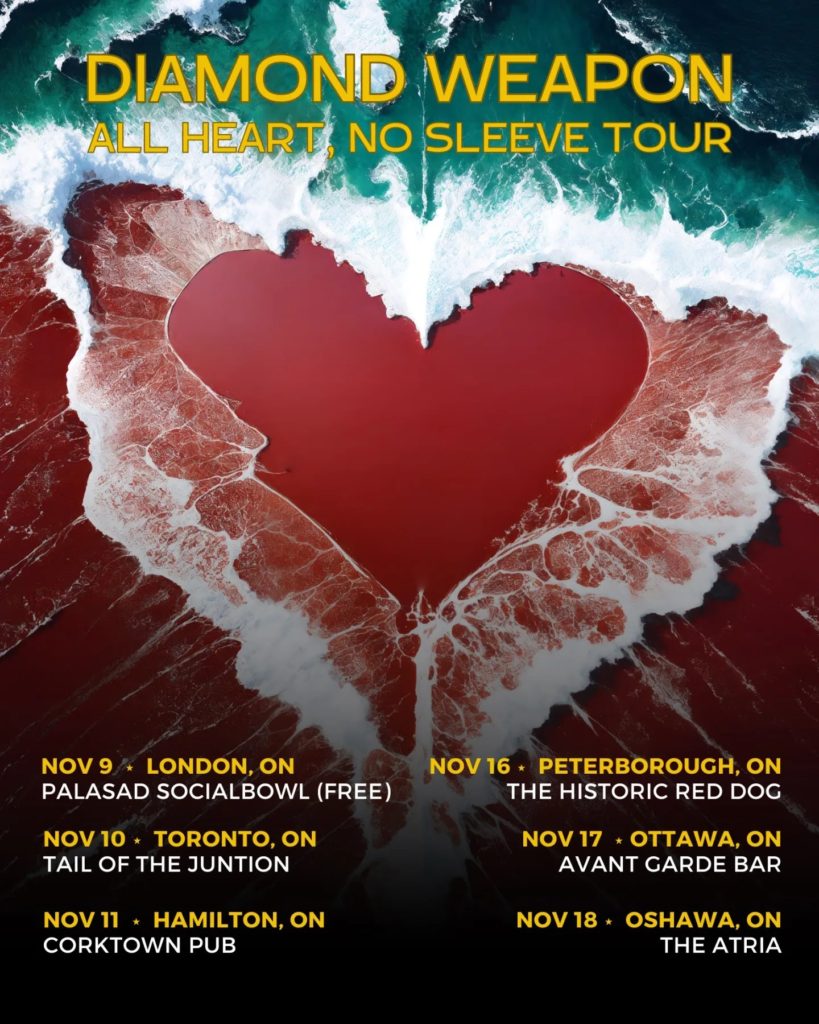Conducted By: Denis Bridger

Toronto post-hardcore mafiosos Diamond Weapon formed in late 2016 and quickly bonded over their love of punk, post-hardcore and playing music. Drummer Jason Bradfield recruited his childhood friend Stephen Maclean to join the band on guitars and vocals in late 2021 to complete the lineup as it is today. The bond has remained so strong that, nearly a decade later, the band and fans are still reaping the sonic benefits of this musical kinship.
After releasing their first demos in 2017, the band rose up quickly, headlining a sold-out show at the Monarch Tavern in Toronto and opening for Canadian Icon Danko Jones at the Bovine Sex Club (Toronto) during Canadian Music Week. By 2018 they had released their first full-length album All I Wanted Was The Other Side and opened for one of their favourite bands, Eyes Set To Kill, on their Canadian tour dates.
The Metal Pit’s very own brit (living in Spain), Denis Bridger, had the opportunity to sit down with vocalist/guitarist Louis Tentsos to discuss all things Diamond Weapon!

Regarding the band name: Is it a Final Fantasy VII reference (Diamond Weapon is a boss in Final Fantasy VII) or is that just coincidence?
Louis Tentsos: It is one hundred percent a Final Fantasy reference! Originally, the plan was to call the band ‘Emerald Weapon,’ since it was the most powerful of all the Weapons in the game. However, a metal band from Portland beat us to the punch on that one, so we decided to go with Diamond Weapon as it was the next coolest sounding name.
On the band’s influences/inspirations, as well as the influences of the post-hardcore scene in general…
LT: I think post-hardcore was sort of born out of a notion in the hardcore movement where people liked the aggressiveness of the music, and the heavy guitars and breakdowns, but wanted to add a little something to it – a little bit of melody, dynamic shifts and dissonance that’s used a lot in post-rock music. I know a lot of people consider Fugazi to be the sort of ‘Godfathers of Post-Hardcore’, but the stuff that we grew up listening to in late 90s and early 2000s was the stuff that really got us into it; Bands like Refused, At The Drive-In, Thursday, Glassjaw and Thrice.
On why Diamond Weapon is considered “weird” in post-hardcore circles…
LT: I think a lot of it comes from an innate desire to almost always do the opposite of what is popular. Even as a kid, I had an innate desire to be different and stand out from everyone else and be the ‘weird kid,’ both fashion and behaviour wise. Musically, not only is our style of music generally considered pretty weird, with the spoken word-style vocal delivery over some chaotic music, but people are often shocked at how down-to-earth and sometimes awkward we are offstage, just because we are so intense and out there while performing. I know all the music gurus generally say ‘Be Social! Go Network!’, but I’m much happier putting away my equipment and hiding behind the merch table. I think part of that is how uncomfortable I am receiving praise, but that’s for me and my therapist to figure out (laughs).
On how the band came together…
LT: Marco and I were in a band together prior to Diamond Weapon, and when that fizzled out, we had a desire to keep making music together. So we threw ads on Craigslist and Kijiji, and that’s how we found Jason and (former guitarist) Nick. When Nick left the band in 2021, Jason actually recruited his childhood friend Stephen to play guitar, as they had been in bands together in the past so he really trusted him, and that’s how the current iteration of Diamond Weapon came to be.
On the songwriting process…
LT: Music wise, it’s very democratic. Usually, one band member will bring in something from a riff to a nearly completed song, and then the rest of the band will come in and throw our flair on it, until it’s something that we’re all happy with. For example, our first single from the new record, ‘Heaven In The Cold Clouds’ – Marco was actually the one who came in with three or four solid riffs, and we kind of patched it all together, and the end result was what came out on the album.
The only place I’m actually fairly dictatorial is the lyrics. I’m pretty adamant about singing my own words as they have to be my emotions. That’s why for a song like Dorothy, Stephen takes over the lead vocals. He wrote the lyrics for that song, but even though I’m the ‘lead vocalist’ I would rather he sing that one since they are his words.
The lyrics are very down to earth with topics that I think many of us can relate to (especially these days). There’s a lot of emotion, angst, frustration with things such as relationships and dreams of the future. An example of this can be found in ‘A Harsh Lesson In Vulnerability.’ To me, it seems to be about someone who lives abroad but the experience might not have gone so well and they felt like a fish out of water. Is this a personal experience or just general observation of life?
LT: That’s one of my favourite songs that I’ve done lyrically, as it touches on so many things. The song itself is about a couple who despite going to university and having jobs and working hard and trying to ‘make it work,’ are simply failing to make ends meet because of how expensive the cost of living is. Eventually, the narrator of the song takes a well-paying job overseas, away from the love of his life, because he knows that if he does that for six months, they will be better off in the long haul. However, that doesn’t stop him from being miserable and feeling like an outsider and alone the entire time, but all those feelings are compounded by the fact that the person he loves most is not there with him. It has themes of love, and frustration, and isolation, and even about the cost of living, which is especially problematic here in Toronto, but I imagine in many other places too.
‘Dorothy’. What’s the story behind this song? Is it a metaphor or literally just about Dorothy and the yellow brick road?
LT: I wish Stephen were here to give you the more accurate picture, but he wrote the song in response to the Australian wildfires of 2019-2020. The song is about the ‘profit over people’ philosophy that so many corporations have. The opening lines ‘you need your coal, you’re so damn old,’ is kind of a call out to those who are destroying the planet for their own personal greed and comfort. The ‘yellow brick road’ is the road to a sustainable world, but the road is being bombed from all fronts to ensure that no one makes it to the end. At least, that’s my interpretation. Stephen may kill me if I’m dead wrong.
‘Who Survives The End Of The World?’ is very emotive with a palpable sense of kindness and sadness. I get from this song that there was some sort of extended separation that led to a lot of worry. Was this song written from personal experience? Is the voicemail we hear in the song from a real-world situation?
LT: Kind of. That song was meant to be a lead in to ‘Only The Cowards,’ which is about someone who moved away from their hometown to try and escape their world, but after being alone and suffering for quite some time, realizes that maybe some of the relationships that ended in the past weren’t as bad as they thought – and maybe would have been better than being alone. While I don’t think that’s universally true – there are plenty of unhealthy relationships where I think being alone would be much better – but I do think that’s not an uncommon feeling some people feel when they’re feeling alone.
I wrote that song at the height of the pandemic, when I couldn’t leave the house basically for a few months, so that’s how I was feeling at that moment. ‘Who Survives’ was supposed to be the other side of that story – the other person on the other end. The person who says ‘we may not have had a future together, but I still hope you have a good future on your end.’

I can clearly hear that you have the punk ethic of DIY. After watching one of your videos about mixing and mastering, it seems that you use a good amount of plug-ins during post-production (as we all do), but you also seem to only use them for minimal effect (some saturation, compression, a little delay, reverb) but not so much that it sounds over-produced. I really enjoy the nice clear sound with each instrument being quite discernible. How important is it for the band to get your live sound as close to the record as possible (and vice versa?). And thanks for recommending some plug-ins for us tech-heads!
LT: Thank you! Speaking of the pandemic, that was my pandemic activity – we couldn’t have band practice for periods, nor could I do anything I usually do like play hockey, get together with friends, or go to shows, so I spent a lot of my free time taking courses on audio engineering from Hardcore Music Studios, Pro Mix Academy, and Nail the Mix. And it’s a balancing act – you do want the songs to be the best that they can be on the recording, but you don’t want to go so far where you can’t replicate performing the songs live.
In that latter scenario, a band would probably be considered a ‘“’studio magic’ band, and I didn’t want that. I wanted the record to sound as chaotic as the songs are live, but with enough control and tightness where it sounds good. I think of At The Drive-In‘s Relationship Of Command which is one of my all-time favourite records, as I think they accomplished that very feat. So, for this record it was me trying to channel that mindset. I should mention that the album was mastered by Scott Middleton, and he did an absolutely amazing job with it, so it wouldn’t be the same without his work!
I may be wrong, but I get the feeling that there is a thread of a story running through the album. Is there a concept in place or am I reading into things incorrectly?
LT: Yes, actually! Originally, when I started writing the lyrics for the record, the plan was for it to be an almost concept album, telling the story of a man who is frustrated with 9-5 ‘city’ life, and moves to an off-grid cabin in the middle of nowhere to escape from everyone and everything. However, receiving no social interaction, he would slowly go insane and ultimately pass away alone as his pride prevented him from ever going home. However, he would look onto the world from the afterlife waiting to reunite with the people he left behind and missed immensely. Then I put a fork in it because I’m not sure that a ‘concept’ album was the way to go.
Abunch of the songs on the record are born from that story – particularly ‘Heaven,’ ‘Cowards,’ and ‘Science Fiction.’ And even the songs that aren’t part of that story still touch on the prevailing themes – on loneliness, on pride, on heartbreak, on society. Again – it was the pandemic, and I spent a lot of time alone, so a lot of the songs are about that (laughs).
In November you are touring Ontario. Any plans for more shows in 2024 in Canada or elsewhere? How is your fan base on this side of the pond? Any plans on getting to Europe?
LT: Oh man – that would be the dream. I know we have small but loyal contingents of fans in
Europe – I’m always completing Bandcamp merch orders to places like Germany, Austria and Greece. My hope is that one day we can make it out to them. It’s hard as an indie band to make that big of a jump, but at the same time, I see other of my fellow Canadian indie bands do it all the time, so I know it’s possible. Maybe I should be asking them for advice (laughs). But yeah – the Ontario tour with the release of the record in November, and then probably a wider tour across Canada in the spring of the new year, once some of the snow has melted and travel is a little safer. After that – who knows? The US and Europe would be amazing. Hopefully, all your readers buy or stream the new record – the bigger the audience, the more likely we are to visit!
Love the album guys! You have succeeded in opening my eyes to post-hardcore, and I can now say I am a fan of the sub-genre, and a BIG fan of Diamond Weapon. Much appreciated.
LT: Glad to hear it! Thanks for having me!

Head over the official Diamond Weapon Facebook page and over follow the band over on Bandcamp.